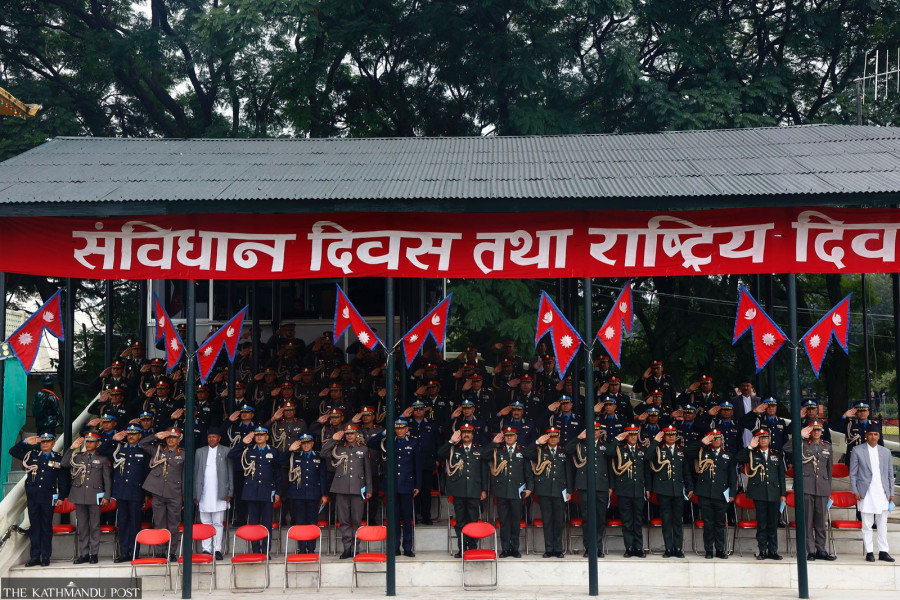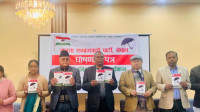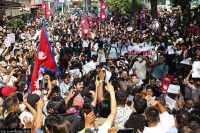National
A decade into force, Nepal’s constitution at a critical juncture
Government formed under Gen Z pressure faces daunting task of meeting demands without violating the charter.
Binod Ghimire
Amending the constitution was among the major agreements between the CPN-UML and Nepali Congress in July last year, when the parties joined hands to form a new government with nearly a two-thirds majority between them.
Even as leaders from both parties continued claiming that they are for revising the constitution, they did nothing much in over a year-long power-sharing partnership.
However, last week’s Gen Z uprising that toppled the KP Sharma Oli-led government created a situation where an extra-constitutional path had to be adopted to navigate the new political reality.
The youth uprising has already altered the constitution. The appointment of Sushila Karki as prime minister is extra-constitutional for two reasons: first, she was not a member of parliament, and second, she is a former chief justice.
According to the constitution, only a member of the House of Representatives can be prime minister and it completely bars chief justices from taking any political position.
“Yes, the uprising prompted some decisions that went beyond the constitution. It might have done some damage to the constitution and constitutional spirit, too, but the decisions are legitimate,” said Mohan Lal Acharya, a constitutional lawyer. “The damage to the constitution can be repaired.”
The Gen Z uprising, triggered by a social media ban, largely focussed on corruption, poor governance, and lack of accountability among those in power. While unseating the old political guard was the prominent demand, constitutional revision was not.
However, the dominant demands now include having a directly elected executive head and the creation of a high-level corruption oversight mechanism. As there is already the Commission for the Investigation of Abuse of Authority, a constitutional body, establishing a new mechanism would require amendments to the constitution.
As the country marks a decade of the promulgation of the constitution, the country’s main law stands at a critical juncture, say constitutional experts.
“Even if we don’t want to, the constitution stands at a critical juncture. It can be saved if its revision is done through a legitimate process—by elected representatives. Attempting to make changes by any other means will consequently lead to its collapse,” said senior advocate Purna Man Shakya, a professor at the Nepal Law Campus. “Even the Nepal Bar Association considers revision necessary, but only through the legitimate process.”
President Ramchandra Paudel invoked Article 61 (4) of the constitution to appoint Karki as interim prime minister while keeping the entire process within constitutional bounds. The Article states that the main duty of the President shall be to abide by and protect the constitution.
Experts say the constitution can be saved if the Karki-led government sticks to its mandate, which is controlling corruption, holding timely elections, and investigating state atrocities against protesters and destruction of property.
“Forming a constitution suggestion committee to list the necessary changes and getting them endorsed by the new parliament could be one way to save the constitution while also addressing the new demands,” said Acharya. “Vital issues could also be settled through a referendum alongside elections for the federal parliament.”
Amid concerns over the future of the constitution, the interim government appears focussed on working within the current constitutional framework rather than looking beyond it, say experts. Addressing a function to mark the constitution day on Friday, Prime Minister Karki said non-implementation of the constitution in its true spirit is the main reason for the current state of affairs.
“After a decade of the constitution’s implementation, we are now at a point where we must seriously reflect on what we have achieved, what we have failed to achieve, the shortcomings along the way, and the direction we need to take moving forward,” Karki said.
She further said the [Gen Z] movement emerged due to shortcomings in governance, prosperity, and development, unlike what was envisioned by the constitution, along with public dissatisfaction and unfulfilled promises.
“The Gen Z movement is also a result of our failure to live up to the democratic values we committed to, including the federal republican system, civil liberties, fundamental rights, human rights, complete press freedom, an independent, impartial, and competent judiciary, the rule of law, and good governance,” she said, speaking at the function at Tundikhel parade ground in Kathmandu.




 20.12°C Kathmandu
20.12°C Kathmandu















